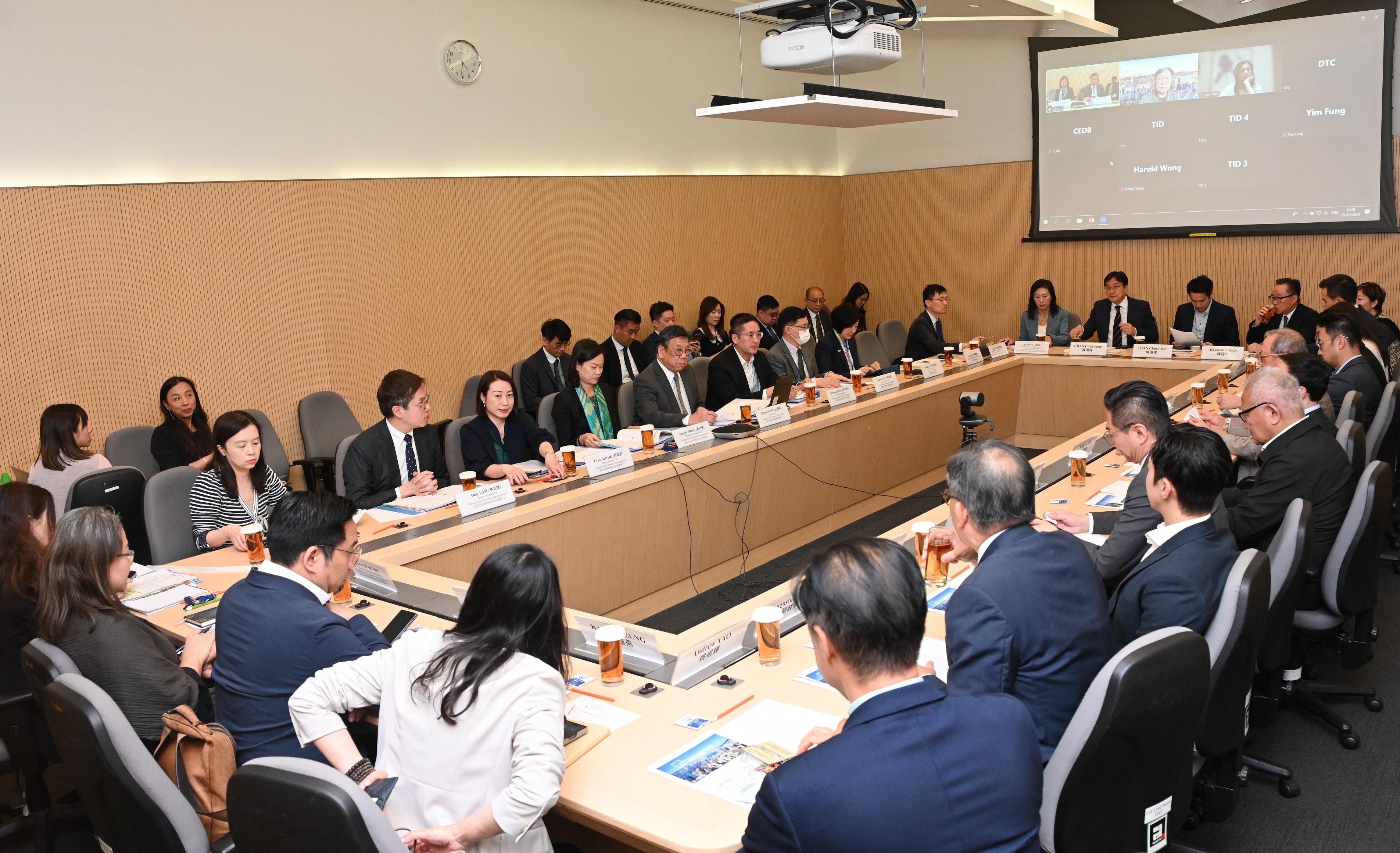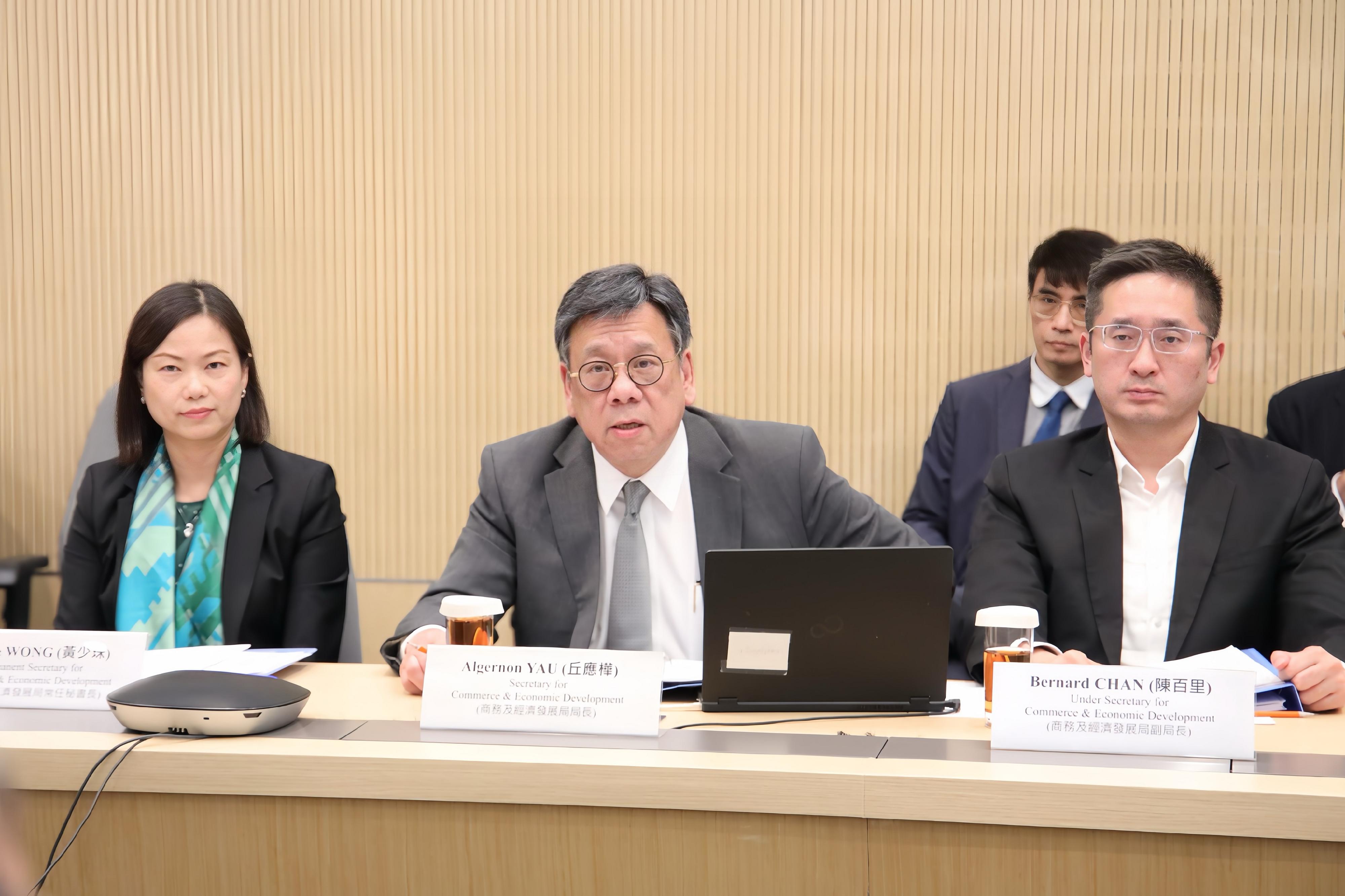CEDB briefs Trade and Industry Advisory Board on Policy Address (with photos)
The Secretary for Commerce and Economic Development, Mr Algernon Yau, briefed members of the Trade and Industry Advisory Board on major initiatives related to economic and trade developments in "The Chief Executive's 2024 Policy Address" at a meeting today (October 29).
Mr Yau said that the Policy Address announced a series of initiatives to create new impetus for Hong Kong's economic development, among which, in light of the successful experience of driving the red wine trade through exemption of wine duty, the Government decided to reduce the duty rate for liquor with a view to promoting high-end liquor trade and the development of the relevant high value-added sectors. Under the new two-tier system, the duty rate for liquor with an import price over $200 will be reduced from 100 per cent to 10 per cent for the portion above $200, while the duty rate for the portion of $200 and below as well as liquor with an import price of $200 or below will remain unchanged.
Mr Yau pointed out that currently about 85 per cent of the duty-paid liquor in Hong Kong (in terms of litre) are with an import price of $200 or below, which will not benefit from the reduction in liquor duty so as to avoid providing an incentive for members of the public to increase liquor consumption as a result of the deduction in liquor duty. Therefore, the proposal has struck a balance between various policy considerations such as facilitating high-end liquor trade, maintaining healthy public finances and safeguarding public health.
Mr Yau also briefed the members on the proposal introduced in the Policy Address to build a high value-added supply chain service centre, leveraging Hong Kong's unique advantages of attracting overseas enterprises and assisting Mainland enterprises to go global. The global trade landscape is undergoing constant changes, with parts of supply chains shifting to the Global South and Belt and Road countries, while many Mainland enterprises are proactively establishing their presence abroad. Riding on this trend, the Government is dedicated to providing high value-added supply chain services for these enterprises by capitalising on the multidimensional advantages of Hong Kong's highly open environment and a sophisticated system of professional services, etc.
He added that Invest Hong Kong and the Hong Kong Trade Development Council will set up a mechanism and enhance their interfaces for attracting Mainland enterprises to establish international or regional headquarters in Hong Kong for managing offshore trading and supply chains, and providing one-stop diversified professional advisory services for enterprises in Hong Kong looking to go global.
Mr Yau highlighted that the Policy Address has rolled out various support measures for small and medium-sized enterprises (SMEs), including relaunching the principal moratorium arrangement under the SME Financing Guarantee Scheme, as well as raising the maximum indemnity ratio of the Hong Kong Export Credit Insurance Corporation to 95 per cent to provide greater export protection for enterprises.
To support SMEs in seizing opportunities in e‑commerce, the Government will expand the geographical coverage of "E-commerce Easy" to the 10 countries of the Association of Southeast Asian Nations (ASEAN), and plans to inject $1 billion into the Dedicated Fund on Branding, Upgrading and Domestic Sales to cater for the expansion of "E-commerce Easy" to the ASEAN market and the targeted funding support for enterprises to implement green transformation projects. In addition, the Hong Kong Shopping Festival will continue to be held during the next two years, and will also be launched for the ASEAN market in due course along with the expansion of "E-commerce Easy".
​Meanwhile, representatives from the Trade and Industry Department also briefed the members on the Second Agreement Concerning Amendment to the Mainland and Hong Kong Closer Economic Partnership Arrangement Agreement on Trade in Services (Amendment Agreement II). The Amendment Agreement II introduced new liberalisation measures across different service sectors where Hong Kong enjoys competitive advantages, making it easier for Hong Kong service suppliers to establish enterprises and develop business on the Mainland.
Mr Yau concluded that the series of measures will provide better support for SMEs especially in addressing the challenges encountered during economic restructuring, while at the same time further promoting economic and trade developments as well as strengthening and enhancing Hong Kong's status as an international trade centre, thereby enabling the steady advancement of Hong Kong's economy.

